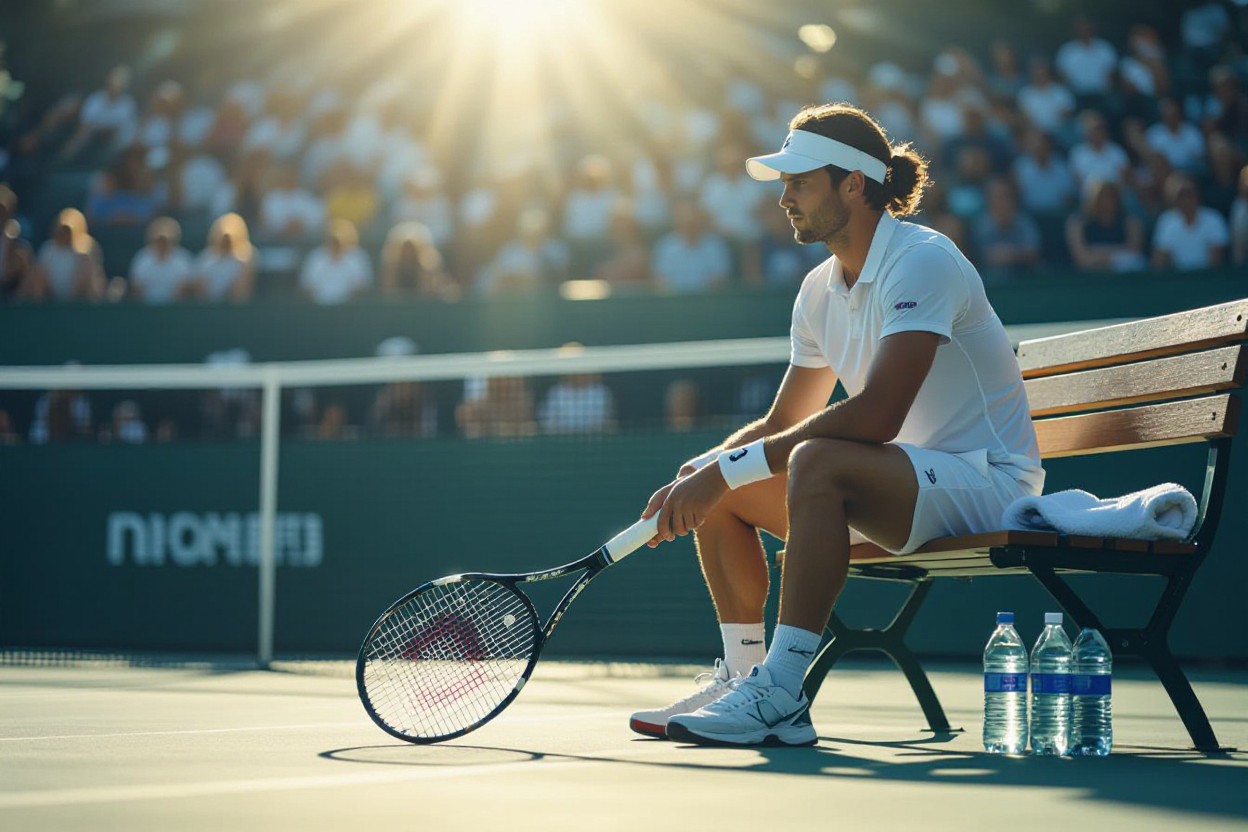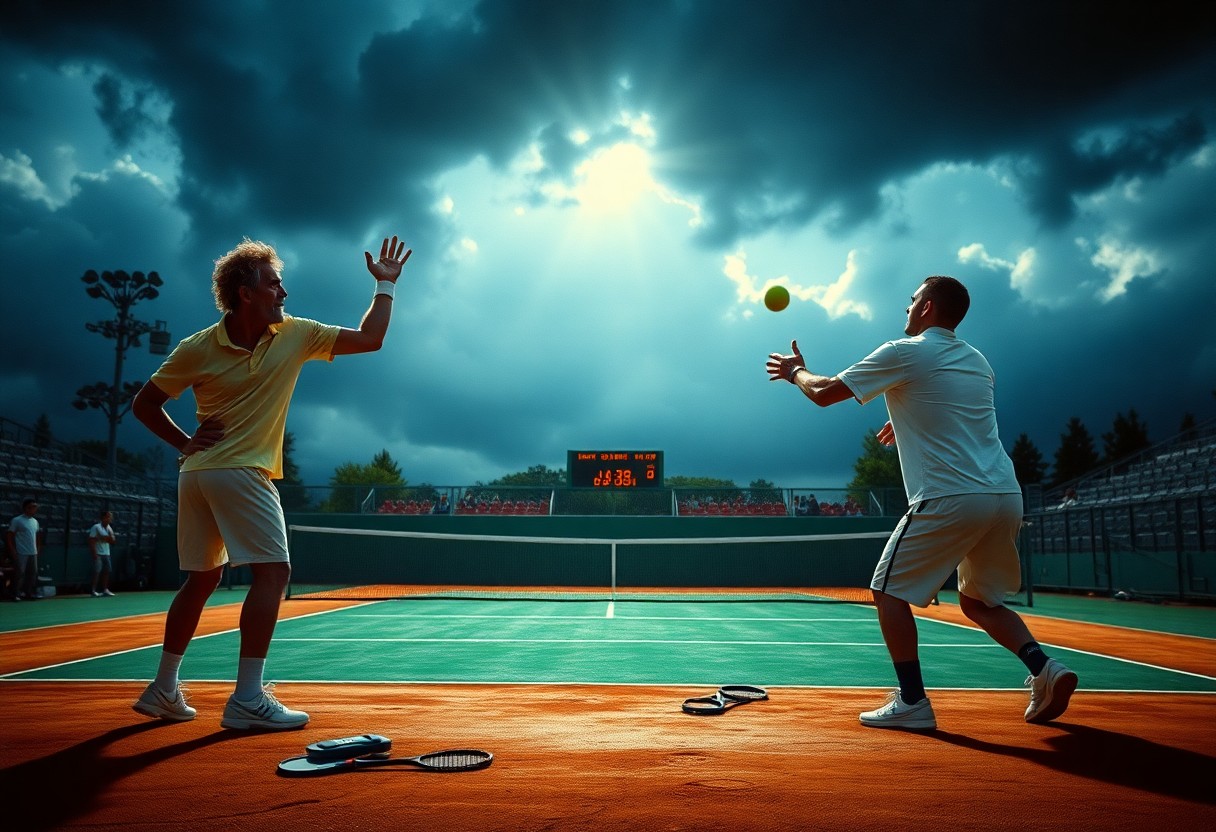Many players focus on physical skills and techniques, but the true difference between winning and losing often lies in your mental game. In tennis, your ability to stay calm under pressure, manage stress, and maintain confidence can give you an unmatched advantage on the court. Understanding the psychological aspects not only improves your performance but also protects you from mental pitfalls that can derail your match. This post explores how mastering your mind can become the secret edge no one talks about, empowering you to elevate your game beyond just physical talent.
The Mental Game: Beyond Physical Training
Physical prowess takes you far, but your psyche defines the ceiling of your potential. Tennis demands more than strength and agility; it tests your ability to stay calm, focused, and adaptable in high-stress moments. Mental resilience allows you to recover from errors swiftly and maintain a consistent performance, often determining who wins tight matches. You might notice how top players use visualization and controlled breathing to calm nerves between points—tactics that keep the mind as sharp as the body.
The Impact of Pressure on Performance
Pressure often triggers a shift in your brain’s chemistry, increasing cortisol levels and potentially impairing decision-making and motor skills. Studies show that under intense pressure, athletes’ performance can dip by up to 15%. You might find that in crucial points, your muscles tense or your strokes lose precision. Recognizing these physical responses helps you anticipate pressure’s grip and develop strategies to manage it effectively, ensuring your performance stays steady when the stakes are highest.
Strategies for Enhancing Mental Toughness
Building mental fortitude involves deliberately exposing yourself to match-like pressure during practice and developing a go-to routine to anchor your focus. Techniques such as mindfulness meditation, positive self-talk, and goal-setting have been linked to improved concentration and reduced anxiety. Studies with elite tennis players reveal that those who practice mental imagery outperform others by 20% in clutch situations. Integrating these strategies into your training transforms mental toughness from an abstract concept into a measurable skill.
Delving deeper, you can expand your mental toughness by simulating high-pressure scenarios during practice, like playing tie-breaks with consequences or practicing after physical fatigue sets in. Combining this with cognitive-behavioral strategies—challenging negative thoughts and reinforcing confidence—creates a mental habit loop that prepares you emotionally for match day. Partnering with a sports psychologist can accelerate this process, guiding you through personalized mental drills to sharpen your focus and emotional control, which can be the defining difference in critical matches.
Mindfulness and Focus: The Unsung Heroes of Tennis
Developing mindfulness sharpens your ability to stay fully engaged during long rallies and high-pressure moments. Rather than being swept away by worries about the score or past mistakes, staying anchored in the present allows you to react intuitively to your opponent’s shots. Studies show that elite tennis players exhibit higher levels of sustained attention, enabling them to maintain consistency when physical stamina wanes. Cultivating this mental stamina gives you a distinct edge in a game where one split-second lapse can decide the outcome.
Techniques to Cultivate Present-Moment Awareness
Incorporating breathing exercises and body scans into your practice sessions can train your mind to tune into current sensations and thoughts without distraction. For example, focusing intently on the rhythm of your breathing between points calms nerves and resets your focus. Additionally, anchoring your attention on the feel of the racquet or the sound of ball impacts during play can ground you in the moment, preventing your mind from wandering into negative or distracting territories.
The Role of Visualization and Imagery
Visualization techniques allow you to mentally rehearse shots, strategies, and entire matches, preparing your brain for real-time execution. Imagining the precise trajectory of your serve or the perfect placement of a backhand enhances neural pathways associated with those movements. This mental simulation improves confidence and reduces anxiety by familiarizing you with success before stepping on court, turning visualized scenarios into tangible performances.
Research involving top-tier athletes reveals that visualization activates the same neural regions involved in physical movement, reinforcing skills without physical exertion. Players like Novak Djokovic credit mental imagery for refining their game under pressure, rehearsing challenging scenarios until responses become automatic. By vividly picturing opponent weaknesses or ideal point construction, you program your mind for adaptability and resilience, ultimately expanding your tactical repertoire and sharpening execution.
Emotional Intelligence: Navigating Triumph and Defeat
Learning to manage your emotions during a match offers a distinct edge that often goes unnoticed. Recognizing the subtle shifts in your emotional landscape allows you to adapt strategies under pressure. Success in tennis isn’t just about physical endurance; it’s about emotional resilience. The ability to bounce back after losing a point or maintain calm when ahead can reshape the match’s momentum swiftly. Emotional intelligence grants you that under-the-radar advantage, modulating your responses to stay composed and effective through the unpredictable rhythms of the game.
Understanding Emotions on the Court
You experience a spectrum of emotions throughout a match—from frustration over unforced errors to elation after a perfect ace. Each feeling reflects your engagement and stakes in the contest, offering clues about your mental state. By identifying whether anxiety is creeping in or confidence is rising, you can adjust your mindset accordingly. Studies show players with higher emotional awareness perform better under pressure, as they avoid the pitfall of reactive outbursts that can lead to costly penalties or loss of focus.
Harnessing Emotion for Competitive Advantage
Channeling intense feelings like anger or excitement into focused energy converts raw emotion into a driving force. Instead of allowing frustration to derail your game, transform it into heightened aggression on your serve or sharper focus during returns. Champions like Serena Williams often use emotional surges to lift their intensity rather than let it disrupt their rhythm. This skill turns emotional spikes into tools that can intimidate opponents or energize your play at critical junctures.
Further leveraging emotional energy involves learning specific techniques such as controlled breathing, routine checks during changeovers, and mental imagery to rehearse maintaining composure. These tactics help you recalibrate your emotional state, preventing feelings from overwhelming your strategic thinking. By capitalizing on positive emotions and tempering negative ones, you create a psychological environment that enhances decision-making and physical execution, ultimately shifting tight matches in your favor.
The Coach-Athlete Psychological Dynamic
Behind every elite tennis player, a nuanced psychological connection with their coach often drives unseen progress. This relationship extends beyond strategy, shaping how you handle pressure, bounce back from setbacks, and sustain motivation. Navigating this dynamic demands mutual respect and a deep understanding of your individual mental patterns, allowing the coach to tailor feedback and interventions that resonate personally. In fact, studies reveal athletes with high coach-athlete trust levels demonstrate lower cortisol responses in stressful matches, underscoring the tangible impact of this partnership on performance.
Building Trust and Communication
Frequent, honest communication creates a bridge that lets you express vulnerabilities and goals without judgment. When your coach listens intently and calibrates advice based on your emotional state, trust flourishes. You begin to interpret critiques as constructive, not personal, transforming potential friction into growth opportunities. This open dialogue sharpens your self-awareness, enabling quick mental adjustments mid-competition and steady psychological resilience throughout grueling tournaments.
The Coach’s Role in Mental Preparation
Your coach acts as both strategist and mental architect, crafting routines and frameworks that prefigure crucial moments on court. Visualization exercises, deliberate breathing techniques, and simulated high-stakes scenarios are common tools employed to anchor your mind during chaos. By integrating cognitive-behavioral strategies, a skillful coach doesn’t just prepare your game plan—they build an unshakeable mental foundation from the ground up.
Diving deeper, coaches often pioneer personalized mental scripts that mirror your unique responses to pressure. For instance, during the 2019 US Open, top coach Darren Cahill used progressive muscle relaxation with Simona Halep to reduce tension during close sets, enhancing her focus and outcome awareness. These targeted interventions empower you to reframe anxiety as energized focus, turning potential mental hurdles into competitive advantages. Also, your coach monitors day-to-day psychological fluctuations, adjusting mental drills accordingly to maintain peak readiness. This dynamic preparation underscores that winning at tennis transcends physical skill—it’s profoundly psychological.
From Practice to Performance: Bridging the Psychological Gap
Transitioning from drills on the practice court to competitive matches often exposes a psychological gap that separates consistent play from peak performance. You might execute perfect backhands during training, but under pressure, doubts or distractions emerge. Closing this gap demands intentional strategies that replicate match intensity and foster mental resilience, ensuring you don’t just practice well but perform reliably when it counts most.
Simulating Pressure Situations in Training
Creating match-like pressure scenarios during training primes your mind to handle real-game stress. Incorporate elements such as simulated tie-breaks, playing with a score disadvantage, or imposing time constraints between points. These drills elevate adrenaline levels similar to tournament conditions, helping you get comfortable with the heightened stakes and improve mental toughness when facing pivotal moments.
Developing a Winning Mindset Before Matches
Before stepping onto the court, fueling your mind with winning thoughts sets a powerful tone. Visualizing successful points, recalling past victories, and engaging in positive self-talk can reinforce confidence and reduce anxiety. This mental rehearsal energizes neural pathways linked to execution, enhancing focus and responsiveness during your match.
Diving deeper into mindset development, layering your pre-match routine with specific cognitive tools strengthens your readiness. For example, you might practice controlled breathing coupled with affirmations like “I adapt under pressure” or mentally replay strategic patterns that worked in previous wins. Studies show athletes who integrate vivid visualization and affirmations can improve reaction time by up to 20%. Structuring this mental training as a consistent ritual turns your mindset into an unshakable ally, ready to be activated exactly when the match intensity peaks.
Conclusion
From above, you can see that psychology in tennis offers an often overlooked advantage that significantly impacts your performance. Mastering mental strategies like focus, emotional control, and confidence can elevate your game beyond physical skills alone. By understanding and applying these psychological principles, you gain an edge that your opponents might not anticipate, ultimately helping you achieve consistent success on the court.




